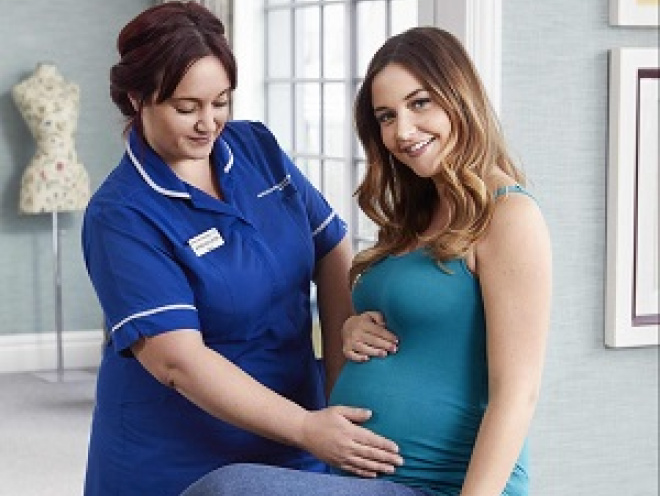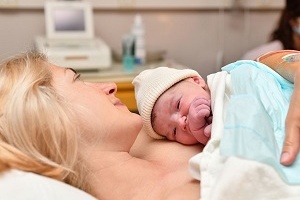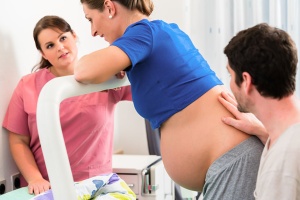Midwives, other specialist medical staff will look after you when you give birth in a hospital, as will your birth partner. Here's what they'll all do...
When you’re pregnant – your GP or midwife
A low-risk pregnancy along with planning a hospital birth mean you’ll probably have most of your antenatal appointments with your GP or community midwives.
Where you have your appointments depends on where you live but it will probably be at your doctor’s surgery or in a local clinic. You’ll probably need to visit the hospital too, for scans and some procedures (NHS, 2017a).
Any special health needs you have mean your midwife, GP and an obstetrician (pregnancy and birth doctor) might all be involved in your pregnancy care. This can mean you have your appointments at a hospital (NHS, 2017a).
During labour
Chances are you’ll have several people helping you through labour. They’ll range from midwives and possibly doctors, to other people you’ve chosen to be with you. Here’s who they’ll be:
1. Hospital midwives and staff
"When you go into labour, the midwives who’ll look after you are usually different to the ones you saw when you were pregnant."
You’ll also find other specialist medical staff on hand in hospital just in case complications arise.
Specialist medical staff include an anaesthetist (pain-relief doctor), who might give you an epidural or anaesthesia if you need a caesarean section. You might also see an obstetrician, who can perform an assisted delivery with ventouse or forceps, or a caesarean section (NHS, 2017b).
2. Doula
Some women choose to hire a doula to support and reassure them through labour (Doula UK, 2018). This is usually a woman who is not medically trained but has plenty of experience of women giving birth.
You’ll need to check with your hospital whether there’s room for a doula in addition to your partner (Tommy’s, 2015). Some hospitals set a limit to the number of people you can have with you (NHS, 2017c).
You can use the Which? Birth Choice guide to regional labour wards and birth centres to find out more about your chosen hospital. Where possible, you can also find contact details so you can book a tour. A tour is a great time to ask questions about who you can have to support you at the birth.
3. Private midwives
If you like the idea of seeing the same midwife throughout your pregnancy and afterwards, you could opt for an independent midwife. Although do bear in mind that like a doula you’ll need to pay for this.
The only thing is that it’s unlikely an independent midwife will be able to help you give birth on the labour ward in their role as a midwife. This is because of issues with insurance (GOV.UK, 2014). They might be able to stay with you though, acting as a doula or birth companion (IMUK, 2018).
4. Private hospital or facility
You could choose to pay to have your baby in a private hospital, or in a private facility within an NHS hospital. That way you should be cared for by a private obstetrician during labour as well as by private midwives who can support you straight after you’ve had your baby (Which, 2018).
5. Birth partner
"Having your partner or a close friend or relative with you when you are giving birth can be a huge support (Bohren et al, 2017). They can help you on an emotional as well as practical level, offering reassurance and praise."
What’s more, your birth partner can make you feel better and help labour along by giving you a massage, stroking your back or holding you. Whatever works for you. They’re also able to talk to the doctors and midwives about your birth plan and preferences if you have more pressing matters to attend to (Bohren et al, 2017).
This page was last reviewed in September 2018.
Further information
Our support line offers practical and emotional support with feeding your baby and general enquiries for parents, members and volunteers: 0300 330 0700.
We also offer antenatal courses which are a great way to find out more about birth, labour and life with a new baby.
Make friends with other parents-to-be and new parents in your local area for support and friendship by seeing what NCT activities are happening nearby.
Which? BirthChoiceUK provides information aimed at helping parents make the right choice about where to give birth.
Bohren MA, Hofmeyr G, Sakala C, Fukuzawa RK, Cuthbert A. (2017) Continuous support for women during childbirth. Available at: http://www.cochrane.org/CD003766/PREG_continuous-support-women-during-childbirth [Accessed 21st May 2018].
Doula UK (2018) What doulas do. Available at: https://doula.org.uk/what-doulas-do/ [Accessed 21st May 2018].
IMUK (2018) Update: independent midwives and birth care. Available at: http://www.imuk.org.uk/news/update-independent-midwives-and-birth-care/ [Accessed 21st May 2018].
NHS Choices (2017a) Your antenatal care. Available at: https://www.nhs.uk/conditions/pregnancy-and-baby/antenatal-midwife-care… [Accessed 21st May 2018].








